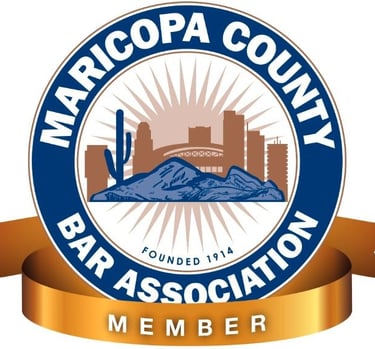Property Transfer by Deed in Arizona: Quit Claim Deed, Warranty Deed, and Average Attorney Fees for Deed Transfer
Applicable Arizona law concerning property deed transfers, common types of deeds including the quit claim deed and warranty deed, as well as the average cost for attorney fees for deed transfers
12/5/20242 min read


Introduction
This blog post addresses conveyances, (or property transfers) in Arizona and focuses on the process of transferring real estate by deed. It will also outline the differences between quit claim deeds and warranty deeds, describe beneficiary deeds, provide average attorney fees for deed transfers in AZ, and the importance of hiring a qualified legal paraprofessional or attorney during real estate transfers in order to ensure proper transfer of property and mitigate risks.
Arizona Law Regarding Deed Transfers
In Arizona, every deed or conveyance of real property must be signed by the grantor, that is, the person granting their interest in the property to another party. Such conveyance must also be duly acknowledged before an authorized officer by law.
In short, a valid transfer of real property requires an instrument in writing (the deed), signed, acknowledged, and delivered. Quit claim deeds and warranty deeds are the two most common types of deeds used in real estate transfers.
Average Attorney Fees and Our Fees for Deed Transfers
Attorney fees for deed transfers will vary depending upon the state and locality, as is the case with all legal services. In Phoenix, the average hourly rate of attorneys is currently around $350.00. However, attorneys fees and LP fees can be awarded by a Court in some circumstances. But, of course, this is only possible if the property in question is part of a legal action.
We offer comprehensive deed preparation and property conveyances for a flat fee of only $300.00 in and around Phoenix.
Beneficiary Deeds /Transfer on Death Deeds
In property conveyance, there are several different types of deeds and each with its own distinct characteristics, purposes, and legal requirements. Beneficiary deeds, for example, when properly executed, automatically transfer interest in a property upon the death of the person holding the interest.
These deeds are not used in real property transactions as they only transfer title to the property to a beneficiary. Accordingly, this title could be derived from a quit claim deed or warranty deed, depending upon the deed provided when the property was acquired by the owner. Beneficiary deeds, also called Transfer on Death Deeds ("TOD"s), are a highly valuable component of an effective estate plan as they allow for property to pass to the recipient while avoiding probate.
Quit Claim Deeds and Warranty Deeds
Again, the two primary types of deeds utilized in real estate transactions are quit claim deeds and warranty deeds.
Quit claim deeds only transfer any interest the grantor may have in the property to the grantee (recipient). Thus, quit claim deeds transfer only that interest which may exist but do so without any warranties of title to the grantee. Accordingly, this type of deed is the less secure from the grantee's perspective among these types of deeds.
Warranty deeds however, do provide guarantees concerning the property's title. These warranties, or promises, place more liability on the grantor but are more secure and favorable to the grantee as opposed to quit claim deeds.
Conclusion
Because of the value of real property, transferring interest is a serious legal matter. Hiring an LP or attorney is crucial to navigate the complexities of Arizona laws concerning these transfers. A licensed legal paraprofessional or attorney will help to ensure that all applicable legal requirements are met and protect the parties' interests as an error can cause the interest in a property to not adequately transfer, or even fail to transfer at all.
Caudill Arundell Law PLC,
Laveen AZ
Top-tier, Trusted & Cost Effective Legal Services. Licensed to practice civil law in the State of Arizona.
Arizona Bar # 500072
Contact
INQUIRe or request a consultation
info@caudillarundelllaw.com
(480) 805-6829
© 2025 Caudill Arundell Law. All rights reserved.
Caudill Arundell Law PLC is owned by Richard C Caudill-Arundell, LP, MLS (Hons), G Cert LP, an Arizona Legal Paraprofessional (“LP”) licensed and endorsed to practice limited jurisdiction civil Law by the AZ Supreme Court.
Legal Paraprofessionals are licensed professionals comparable to Nurse Practitioners as per the AZ Supreme Court and are bound by attorney-client privilege. An additional accurate comparison for LPs would be to a Solicitor within the United Kingdom while attorneys would equate to Barristers. LPs are not attorneys and can only practice law within their authorized area(s) of endorsement. Caudill Arundell Law works with attorneys and may refer clients to attorneys in some matters that are beyond our scope of practice.
As an LP owned firm, we may only offer document drafting and general information in matters outside of our area of endorsement. This means any legal matters that are not or may not come before an AZ Justice Court or Municipal Court, in accordance with the LP Code of Conduct specified in ACJA § 7-210.
Any communications or information derived from this website or from its use do not constitute legal advice and an attorney client relationship is not formed unless specifically indicated by an authorized representative of Caudill Arundell Law PLC.
Caudill Arundell Law PLC will not be held liable for any damages resulting from a visitor to this website relying upon or acting upon any information contained herein for any purpose.


